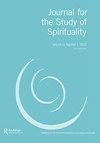Cultivating Spiritual Intelligence for a participatory worldview: The contribution of Archetypal Cosmology
IF 0.7
0 RELIGION
引用次数: 4
Abstract
ABSTRACT Humanity finds itself in a collective liminal space between worldviews, on a trajectory from a dominant scientific materialism towards a participative worldview informed by a spiritual and archetypal consciousness. This paper suggests that Spiritual Intelligence (SQ), the cognitive ability to find higher meaning, value, and purpose in life through transcending rational intelligence may help to birth and reinforce the emerging worldview. The dominant modes of thinking embedded within educational institutions, however, remain within the confines of the mechanistic-materialist model. Nurturing SQ requires multiple ways of knowing, a pedagogy based on engaging the head, heart and accessing our inner experience and intuitive voice. This paper identifies one recent expression of a participative worldview - Archetypal Cosmology - that is not only consistent with post-materialist views of consciousness but can also contribute to cultivating and developing SQ. Archetypal Cosmology is based on an enchanted cosmos in which the microcosm of the psyche is reflected in the macrocosm of the universe through a mysterious yet empirically observable planetary synchronicity. After reviewing the key tenets of SQ and Archetypal Cosmology, the paper: (i) highlights a correspondence between the principles of SQ and the planetary archetypal meanings suggesting that SQ may be a type of Archetypal Intelligence; (ii) illustrates how Archetypal Cosmology provides another mode to cultivate SQ; (iii) suggests that the synthesis of SQ and Archetypal Cosmology, both multi-sensory ways of knowing that include the imaginal, symbolic, mythical and spiritual, may help bring about new modes of thinking to bridge the sciences and humanities.为参与式世界观培养精神智能:原型宇宙学的贡献
人类发现自己处于世界观之间的集体阈值空间,处于从占主导地位的科学唯物主义到由精神和原型意识告知的参与性世界观的轨迹上。本文认为,精神智力(SQ),即通过超越理性智力找到生活中更高意义、价值和目的的认知能力,可能有助于诞生和加强新兴的世界观。然而,教育机构内的主流思维模式仍然局限在机械唯物主义模式的范围内。培养SQ需要多种了解方式,这是一种基于头脑、心灵、接触我们内心体验和直觉声音的教学法。本文确定了一种参与性世界观的最新表达-原型宇宙学-它不仅与后唯物主义的意识观点一致,而且有助于培养和发展SQ。原型宇宙学是基于一个迷人的宇宙,在这个宇宙中,心灵的微观世界通过一个神秘而又经验可观察的行星同步性反映在宇宙的宏观世界中。在回顾了智能智能和原型宇宙学的主要原则之后,本文强调了智能智能原理与行星原型意义之间的对应关系,表明智能智能可能是一种原型智能;(ii)说明原型宇宙学如何提供另一种培养SQ的模式;(iii)表明,综合SQ和原型宇宙学,两者都是多感官的认识方式,包括想象、象征、神话和精神,可能有助于带来新的思维模式,以架起科学与人文的桥梁。
本文章由计算机程序翻译,如有差异,请以英文原文为准。
求助全文
约1分钟内获得全文
求助全文
来源期刊

Journal for the Study of Spirituality
RELIGION-
CiteScore
2.50
自引率
7.10%
发文量
25
期刊介绍:
Journal for the Study of Spirituality is a peer-reviewed journal which creates a unique interdisciplinary, inter-professional and cross-cultural forum where researchers, scholars and others engaged in the study and practices of spirituality can share and debate the research, knowledge, wisdom and insight associated with spirituality and contemporary spirituality studies. The British Association for the Study of Spirituality (BASS) organises a biennial international conference and welcomes enquiries about membership from those interested in the study of spirituality in the UK and worldwide. The journal is concerned with what spirituality means, and how it is expressed, in individuals’ lives and communities and in professional practice settings; and with the impact and implications of spirituality in, and on, social policy, organizational practices and personal and professional development. The journal recognises that spirituality and spiritual values can be expressed and studied in secular contexts, including in scientific and professional practice settings, as well as within faith and wisdom traditions. Thus, Journal for the Study of Spirituality particularly welcomes contributions that: identify new agendas for research into spirituality within and across subject disciplines and professions; explore different epistemological and methodological approaches to the study of spirituality; introduce comparative perspectives and insights drawn from different cultures and/or professional practice settings; aim to apply and develop sustained reflection, investigation and critique in relation to spirituality and spiritual practices; critically examine the values and presuppositions underpinning different forms of spirituality and spiritual practices; incorporate different forms of writing and expressions of spirituality.
 求助内容:
求助内容: 应助结果提醒方式:
应助结果提醒方式:


